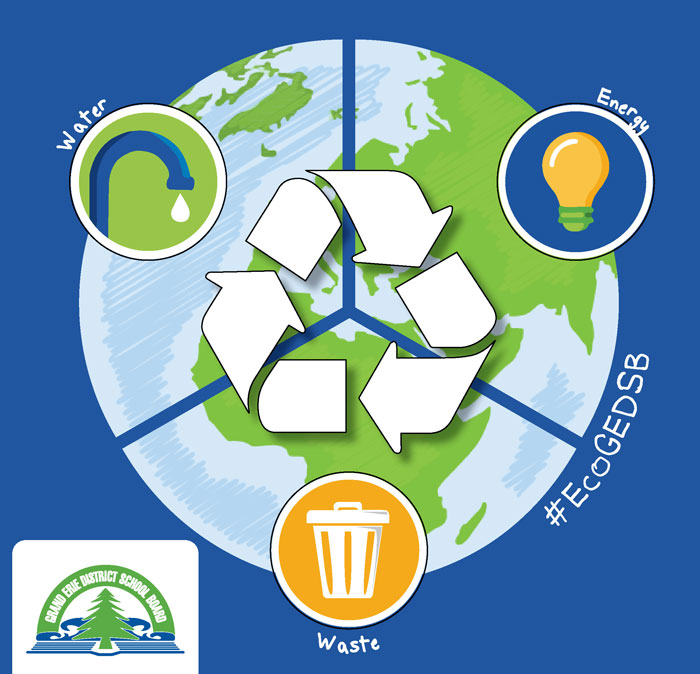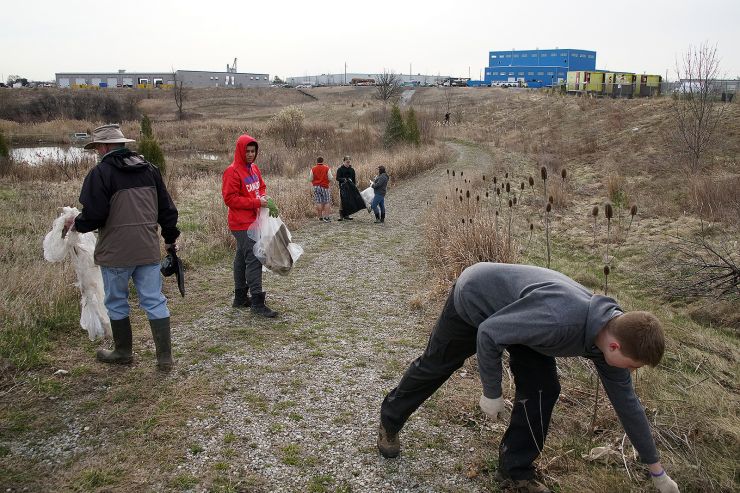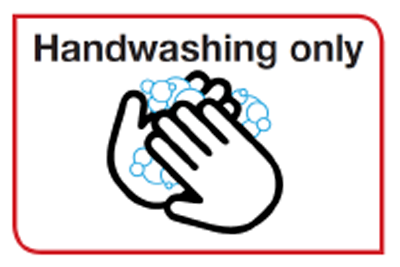Facility Services
Sustainability and Energy

Energy & Sustainability Officer:
Chris McAnally
Environmental responsibility is incredibly important, and Grand Erie schools are doing their parts to improve ecological literacy and stewardship in their classrooms and communities.
Many of our schools are working to enhance their environmental responsibility through recycling programs and reducing energy consumption. Grand Erie has also been working with Ontario EcoSchools to nurture environmental leaders, reduce the ecological impact of schools, and build environmentally responsible school communities.
This program is a great example of the difference students and teachers can make to improve our environment. Here are a few of the ways Grand Erie schools are working to lessen our collective carbon footprints:
Energy Conservation
Climate Change is a serious threat to our physical environment. Grand Erie District School Board plays an important role in educating staff and students understand what they can do to conserve energy and reduce greenhouse gas emissions.
We depend on energy for virtually everything in our lives, however, energy use greatly affects the environment through the release of greenhouse gases. Making small changes to reduce energy consumption in our own lives will lead to a significant difference in our overall environmental impact.
Ways you can conserve energy:
- Turn off lights and electronics when you leave a room.
- Use energy during off-peak hours.
- Set your thermostat a few degrees lower in the winter.
- Space around vents are kept free of obstructions.
- Use cold water to do your laundry.
- Don’t leave the refrigerator door open.
- Upgrade to energy efficient lights.
- Close curtains on hot sunny days to block the sun.
- Make use of timers on electronics where possible.
Grand Erie District School Board & Energy:
- Use of Building Automation Systems to manage equipment.
- Retrofit of all lighting.
- Renewable Technologies including Geothermal System installed within schools and solar panels on some rooftops.
Waste Reduction

Reduce! Reuse! Recycle! As a consumer society, we produce a vast amount of waste that ends up in landfills around the world. Reducing the amount of waste that we produce will greatly help in the health of our environment. When reducing and reusing aren’t possible, aim to recycle.
Ways you can reduce your waste:
- Buy products with less packaging.
- Take reusable bag with you when shopping.
- Avoid disposable plates, cutlery, etc.
- Use a reusable water bottle or travel mug.
- Pack a litterless lunch.
- Donate items that you no longer use or don’t fit you anymore.
- Learn what can and cannot be recycled in your area and recycle.
- Set up GOOS (Good On One Side) bins to use both sides of the paper.
- Compost.
- Send an email instead of a paper note.
- Consider if you really need things printed before you press prin.t
Grand Erie District School Board & Waste Reduction:
- GEDSB has partnered with local municipalities to offer our schools curbside recycling.
- Recycling programs available in every school.
- Waste Management programs.
- Composting programs in select schools.
Grand Erie District School Board and Water
- Installation of a grey water system.
- Ensures safe drinking water for all occupants with monitoring and testing.
- Installation of smart water meters.
Lead in Drinking Water
Since 2007, the Ontario government has been requiring schools to flush the plumbing in their facilities and test their drinking water annually for lead. This is in accordance with O. Reg 243.07. For additional information on the requirements, please visit: https://www.ontario.ca/page/flushing-and-sampling-lead
Ontario Drinking Water Standard
The Ontario drinking water quality standard for lead is 10 micrograms per liter (also written as 10 µg/L or as 0.010 milligrams per litre). This is based on a national guideline from Health Canada.
Lead Exceedance
If there is a lead exceedance on a water sample at a school, a report is made to Public Health and the Ministry of Environment, Conservation and Parks. If the exceedance is on a standing sample, the school is immediately moved to daily water flushing of all drinking water fixtures. If the exceedance is on a flushed sample, the fixture is immediately removed from service and we begin remedial actions to address the issue. Each exceedance is unique and involves investigation, remediation and verification through two sets of resamples. Once the acceptable results are achieved, the fixture is returned to service. Fixtures are not returned to service without approval of the local Health Unit.
Test Results
Grand Erie’s most recent test results will be posted soon. This is updated annually.
Handwashing Only Signs

Water Conservation and Stewardship
“Water is the driving force of all nature.” – Leonardo da Vinci
Water is essential for life. Fresh drinking water makes up less than 1 per cent of the world’s total water supply. Water is a necessity for not only humans but for all living species. A significant portion of the world’s biological diversity is dependent on inland and marine aquatic habitats. Therefore, the importance of making informed decisions, and taking action to protect and conserve our water sources is essential in the protection of our planet.
By educating present and future generations of the value of our aquatic ecosystems, we will avoid habitat destruction and the loss of biodiversity, and strive towards protecting and restoring aquatic habitats. Effective water stewardship will lead to an enhanced quality of human life.
Ways that we can be better water stewards:
- Take shorter showers.
- Shut the water off while brushing your teeth.
- Dispose of chemicals properly.
- Limit the amount of pesticides used.
- Help clean up around streams (parent supervision).
- Recycle and dispose of all trash properly.
- Pick up after pets.
- Run only full loads of dishes and laundry.
- Don’t put anything except water down storm drains.
- Fix water leaks at your home.
- Choose non-toxic household products where possible.
- Use grey water systems (rain barrel to water plants).
- Mulch around plants.
- Educate yourself on your local watershed.
- Stay informed.
Under Ontario Regulation 507/18, all Ontario public agencies, including school boards, are required to report annually their energy use and greenhouse gas (GHG).The agencies are also required to prepare and make public a five-year energy conservation and demand management plan. View Grand Erie’s 2019-20 Energy Consumption and Greenhouse Gas Emission report submitted to the Ministry of Energy and Grand Erie's Energy Conservation and Demand Management Plan (2019) below:
- Grand Erie Energy Consumption and Greenhouse Gas Emission Report
- Grand Erie Energy Conservation and Demand Management Report
For more information related to Grand Erie's environmental initiatives, contact Chris McAnally, Energy & Sustainability Officer, at: christopher.mcanally@granderie.ca or at 519-756-6301, ext. 281190.
